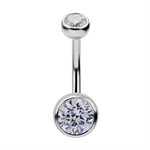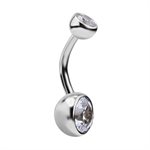- Homepage>
- Jewelry>
- Belly Button Rings (Navel Banana)>
- 18k white gold internal jewelled navel banana
18k white gold internal jewelled navel banana
Suggested Retail price: CAD $1,118.81
- Main material : 18 karat gold
- Secondary material : Same
- PVD Coating : None
- Gem type : Cubic zirconia
- Threading : Internal
- Classification : Navel
- Availability: In stock
Gold
Gold is considered as one of the most precious metals in the world and is appropriate for initial piercings if it is 14k or 18k. Gold higher than 18k is too soft for body jewelry because it can easily be scratched.
G18K- stands for 18 karat (750 Gold) and G14K- for 14 karat (585 Gold) yellow Gold.
Yellow Gold Alloy Data Sheet
RG18K- stands for 18 karat (750 Gold) Rose gold.
Rose Gold Alloy Data Sheet
WG18K- stands for 18 karat (750 Gold) White Gold which is Rhodium Plated.
White Gold Alloy Data Sheet
Nickel Release Test for White Gold
Wherever there is enough surface space, we mark all our Real Gold items with either 750 (for 18 karat) or 585 (for 14 karat).
Additionally, we also mark our Swiss Responsibility Mark («Verantwortlichkeitsmarke») which guaranties the gold content of our products.
Please note that gold may tarnish and/or deform in the autoclave, and this will void any warranty on product.
Cubic Zirconia
Cubic Zirconia is currently the most popular substitute to a diamond because to the untrained eye they look identical. Cubic Zirconia or CZ as it is referred to is made from zirconium dioxide a different material than diamonds, which although a different chemical composition comes closer than any other gem to matching the characteristics of a diamond.
Natural CZ was first discovered in 1899 but it wasn’t until the late 70’s that man-made CZ first came into production for use in jewelry.
CZ on first impression looks just like a diamond, but under close inspection there are differences, it has a gravity of between 5.6 and 6.0 which means it’s 1.6 times the weight of a diamond. It has a hardness of 8 on the Mohs scale, a refraction index of 2.176 and a dispersive power of 0.060, which means that it’s not as hard as a diamond; it’s slightly less sparkly but displays more prismatic fire which means more colour sparkles within the gem.
Another point to note is that natural diamonds display impurities which CZ doesn’t. It’s also clear in colour which most diamonds aren’t, but they can be coloured by adding metal oxides in the production process. Unlike diamonds, CZ are good thermal insulators which mean they become warm but can’t withstand the same kind of heat a diamond can, which is one test that is used to distinguish diamonds from CZ. Caring for CZ is important because they are more brittle than diamonds and susceptible to wear and tear such as chipping and scratches over time.




